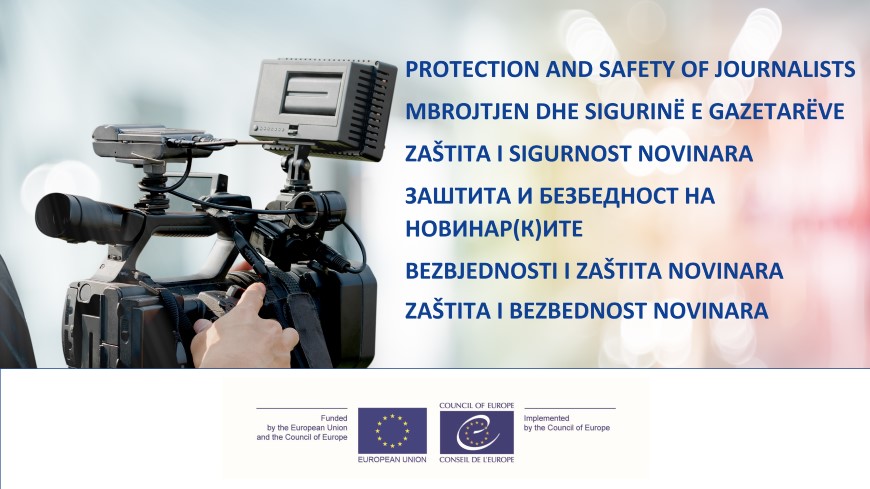New online course on Protection and Safety of Journalists is now available in Albanian, Bosnian, Macedonian, Montenegrin and Serbian.
The course was developed by the Council of Europe Information Society Department, in cooperation with HELP Programme (Human Rights Education for Legal Professionals) within the framework of the action “Freedom of Expression and Freedom of the Media in South-East Europe (JUFREX 2)” implemented under the European Union and Council of Europe Joint Programme “Horizontal Facility for the Western Balkans and Turkey II (2019-2022)”.
Representatives of the Council of Europe Platform for the Protection of Journalism and Safety of Journalists and of the Office of the Council of Europe Commissioner for Human Rights, as well as a senior Lawyer from the Registry of the European Court of Human Rights also contributed to the course development.
Background and aim
Freedom of expression and free flow of information are cornerstones of public debate and democracy.
Yet, freedom of expression and the safety of journalists are facing major challenges in Europe today. In many countries, journalists and other media actors are facing threats such as censorship, political and economic pressure, intimidation, job insecurity, abusive use of defamation laws as well as physical attacks. These offences are often committed in an intolerable context of impunity, which fuels recidivism and has a chilling effect on media freedom.
On the basis of the European Convention on Human Rights and the European Court of Human Rights’ case law, member States have both negative and positive obligations to protect journalists. Not only must they refrain from intimidating political declarations or judicial practices against media actors, they also have the duty to actively grant them full protection of the law and the judiciary in order to create an enabling environment for their journalistic activities.
This free HELP online course aims at assisting legal professionals, but also journalists and law-enforcement officials, in identifying and tackling the threats towards journalists and other media actors. Please read the course brief here.
Course structure
The overall length of the course is approximately 10 hours and is composed of five substantive modules.
- Module 1: Key standards and principles. Introduction to the topic. Freedom of expressions. Journalists and other media actors.
- Module 2: Threats against journalism. Threats against journalists. Effects of the threats. Response to the threats.
- Module 3: Legal frameworks and mechanisms and tools. The United Nations, Council of Europe, European Union and OSCE legal frameworks. Mechanisms and tools for protection of journalists, including the Council of Europe Platform for protection of journalism and safety of journalists.
- Module 4: Physical and psychological integrity. Positive and negative obligations of the State; substantive and procedural dimension of States’ obligation. Impunity for crimes against journalists and effects of impunity.
- Module 5: Journalism in action. Newsgathering: access to places and events, access to public information, protection of sources and whistleblowers etc. Publication: substantive and procedural legal limitations. Journalism on trial. Law enforcement and journalists.
At the end of each module there is a quiz and a summary of the module. Upon finalisation, provided the user has successfully passed the course an electronic statement of accomplishment is provided.
Tutored and Self-learning courses
JUFREX-2 project partners will be able to implement tutored courses on Protection and Safety of Journalists containing information on international standards but also on the Western Balkans region’s domestic legislative and institutional frameworks and practices (Albania, Bosnia and Herzegovina, Kosovo*, Montenegro, North Macedonia and Serbia). These courses will be provided/offered by national training institutions for legal professionals (Judicial Academies, Bar Associations) and Universities in 2021/2022 and used as a tool to supplement traditional educational materials used in legal education, also beyond the project’s life time.
Aside from the tutored courses, the self-learning courses are now available at the HELP platform and in the following languages:
We invite you to check our course on Protection and Safety of Journalists.
Enjoy learning!
---
*This designation is without prejudice to positions on status, and is in line with UNSCR 1244 and the ICJ Opinion on the Kosovo Declaration of Independence.



